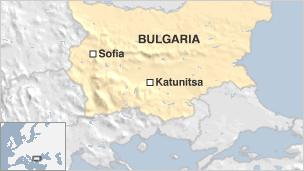About 2,000 Bulgarians have marched in the centre of the capital, Sofia, in an anti-Roma protest.
The demonstrators said they were against corruption and organised crime, which they linked to Bulgaria's Roma or gypsy ethnic minority.There have been protests and sporadic violence since the death a week ago of a youth hit by a car driven by relatives of a Roma clan boss.
President Georgy Parvanov has called for "an end to the language of hatred".
"We stand against this government and the political elite, against the impunity and the corruption," said another protesters.
'Extreme language' The unrest prompted Prime Minister Boyko Borisov and President Parvanov to call a meeting of the national security council.
Afterwards, Mr Parvanov called on the media and politicians to "put an end to the language of hatred pushed to the extreme", AFP news agency quoted him as saying.
The rising tension comes ahead of presidential elections on 23 October.
In Sofia, the far-right Ataka party's candidate, Volen Siderov, spoke to several hundred supporters outside the presidential palace.
 He called for the death penalty to be reinstated and for Roma "ghettos to be dismantled", AFP said.
He called for the death penalty to be reinstated and for Roma "ghettos to be dismantled", AFP said.
Some of the crowd wore shirts that read: "I don't want to live in a Gypsy state."
The unrest began on 24 September after a van carrying family members of Kiril Rashkov - nicknamed "King Kiro" - ran over and killed a 19-year-old man in the southern village of Katunitsa.
An angry crowd of about 2,000 people then gathered and attacked three houses owned by the Roma leader in the village, shouting anti-Roma slogans.
Small but at times violent demonstrations by nationalist youth then spread to other towns over the week.
The violence is thought to be the worst since 1997, when an economic crisis and hyperinflation brought Bulgarians onto the streets.
The Roma make up around 5% of Bulgaria's population of 7.4m.
The unrest highlights tensions in Bulgaria, the poorest country in the European Union, as it struggles to emerge from deep economic recession.
http://www.bbc.co.uk/news/world-europe-15140291
Afterwards, Mr Parvanov called on the media and politicians to "put an end to the language of hatred pushed to the extreme", AFP news agency quoted him as saying.
The rising tension comes ahead of presidential elections on 23 October.
In Sofia, the far-right Ataka party's candidate, Volen Siderov, spoke to several hundred supporters outside the presidential palace.
Some of the crowd wore shirts that read: "I don't want to live in a Gypsy state."
The unrest began on 24 September after a van carrying family members of Kiril Rashkov - nicknamed "King Kiro" - ran over and killed a 19-year-old man in the southern village of Katunitsa.
An angry crowd of about 2,000 people then gathered and attacked three houses owned by the Roma leader in the village, shouting anti-Roma slogans.
Small but at times violent demonstrations by nationalist youth then spread to other towns over the week.
The violence is thought to be the worst since 1997, when an economic crisis and hyperinflation brought Bulgarians onto the streets.
The Roma make up around 5% of Bulgaria's population of 7.4m.
The unrest highlights tensions in Bulgaria, the poorest country in the European Union, as it struggles to emerge from deep economic recession.
http://www.bbc.co.uk/news/world-europe-15140291

Comments